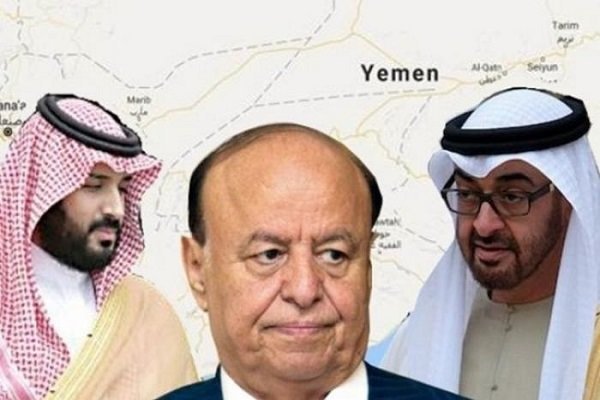Saudi forces clash with UAE militia over power in Yemen

TEHRAN - The dispute between Saudi Arabia and United Arab Emirates (UAE) in Yemen, which has precedent, is intensifying as of late. The struggle between the two forces has peaked in Aden, a region located in southern Yemen.
The militia backing the former president of Yemen, Abdrabbuh Mansour Hadi, is funded by the House of Saud. Mansour Hadi who fled after his resignation is presently barred from reentering Yemen. The Southern Transitional Council, a secessionist organization in Yemen, is backed by the UAE.
According to reports, the clashes between the Saudi and Emirati forces have caused 200 fatalities in southern Yemen.
Leaders of the Saudi-led coalition have gone to great lengths to conceal the disputes between Riyadh and Abu Dhabi, as Saudi officials have been very tight lipped regarding their conflict with the Emiratis.
The fighting between the two armed forces escalated to such lengths that the leader of the Zaidi Revolution Movement Ansar Allah, Sayyid Abdul-Malik Badreddin al-Houthi felt obliged to publically address it. He described the recent conflicts in southern Yemen as a shameless and aggressive “power struggle” between the Saudis and Emiratis, in which both parties were solely serving their own self-interests in the region.
In 2015, Saudi Arabia called on to the UAE to join forces with the aggressive Saudi-led coalition to occupy Yemen and oppress its defenseless people. The UAE agreed to join forces with Saudi Arabia, with a hidden agenda that has recently caused a rift between the two Persian Gulf nations.
The Emiratis have been secretly supporting former Yemeni president Ali Abdullah Saleh, who was a dictator, knowing all the while that the Saudi’s supported Mansour Hadi. In a covert operation, the UAE supported Ali Abdullah Saleh in order to have power and influence in Yemen and gain equal footing in the country, like their rival Saudi Arabia.
Prior to Ali Abullah Saleh’s death, the Emiratis beseeched Saudi Arabian officials to keep Saleh on his throne in Yemen. This show of support caused the Saudis to become suspicious of a covert alliance between the UAE and Saleh.
Thus, a conflict arose between the two countries. However, the Saudis, who needed to align themselves with the UAE in their aggressive coalition against Yemen, made all attempts to resolve their differences through negotiations.
Following three years of combat in Yemen, Saudi Arabia has not allowed the UAE to gain a stronghold in the country. Failure to dominate strategic locations in Yemen has exasperated Abu Dhabi as their presence in Yemen seems to be futile.
As a result, last year Emirati officials decided to limit their presence in Yemen by withdrawing their ground forces but maintained their air force to be used by the Saudi-led coalition. The establishment of Southern Transitional Council intensified clashes between Saudi and Emirati mercenaries in Aden.
An important reason behind the dispute is the “totalization” attitude of the House of Saud; they want it all for themselves. Although Saudi Arabia began its aggression against the defenseless people of Yemen after the establishment of a 17-member coalition, they are yet to share the spoils of war with their allies.
Both the Saudis and Emiratis are closely eyeing access to gas and oil resources in southern Yemen. However, Saudi Arabia opposes UAE access to Yemen’s natural gas and oil reserves which is why the two Persian Gulf nations are currently at odds with one another.
Additionally, Saudi Arabia and the UAE are at odds over their respective relationship with Turkey. The UAE government’s support of Abdel Fattah el-Sisi, the incumbent President of Egypt, has been always frowned upon by the Turkish authorities.
Saudi Arabia, on the other hand, is on good terms with the Turkish government. The fact that Ankara and Riyadh are attempting to expand their influence in the region has sparked outrage among UAE officials.
Abu Dhabi’s meddling in West Asia and North Africa, as demonstrated by their involvement in Tunisia, is also a source of discomfort for the Saudis. Therefore, Riyadh is doing everything that it can to keep Yemen under its control without UAE intervention.
It appears that the aggressive Saudi-led coalition that has been slaughtering the helpless people of Yemen has come to a full-stop, as the UAE, one of the most powerful states in the coalition, has clashes with the Saudis in Yemen.
Amidst the tug of war for dominance in Yemen and covetousness over the spoils of war, the people of Yemen are paying the highest price. Over 13,000 civilians have been killed and some 20,000 have been injured over the totalitarian attitude of Saudi Arabia and the UAE.
